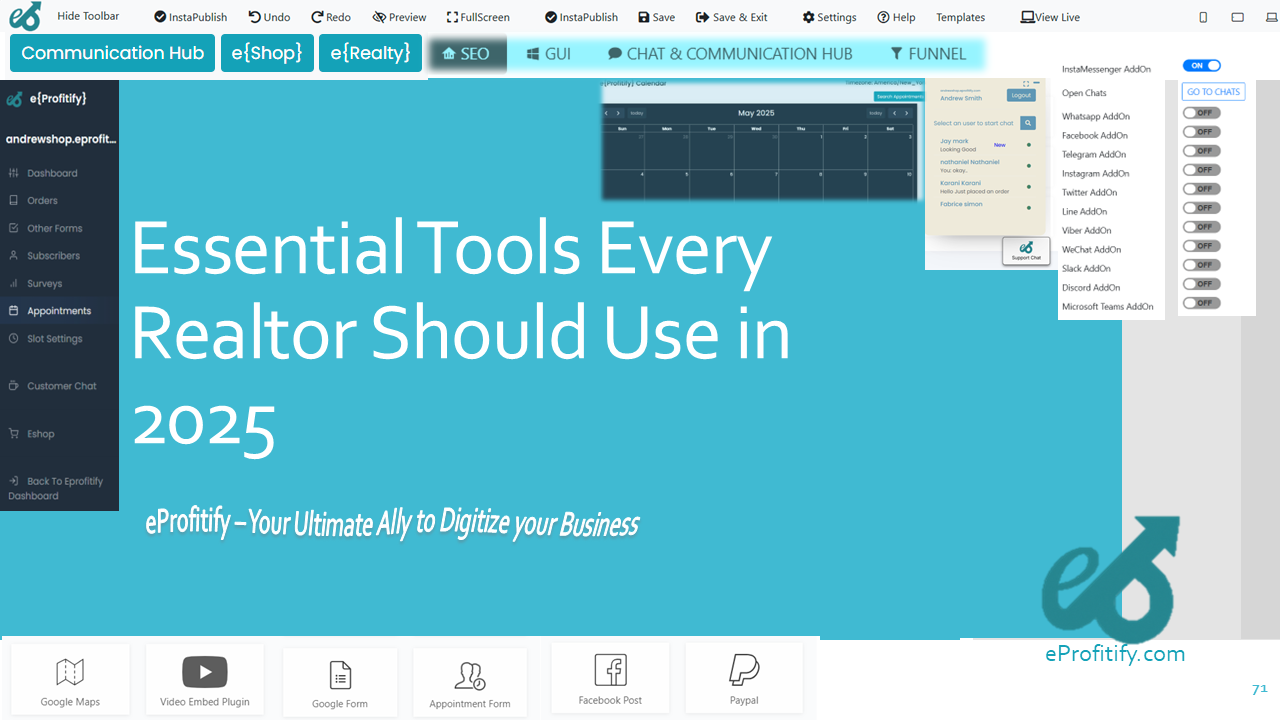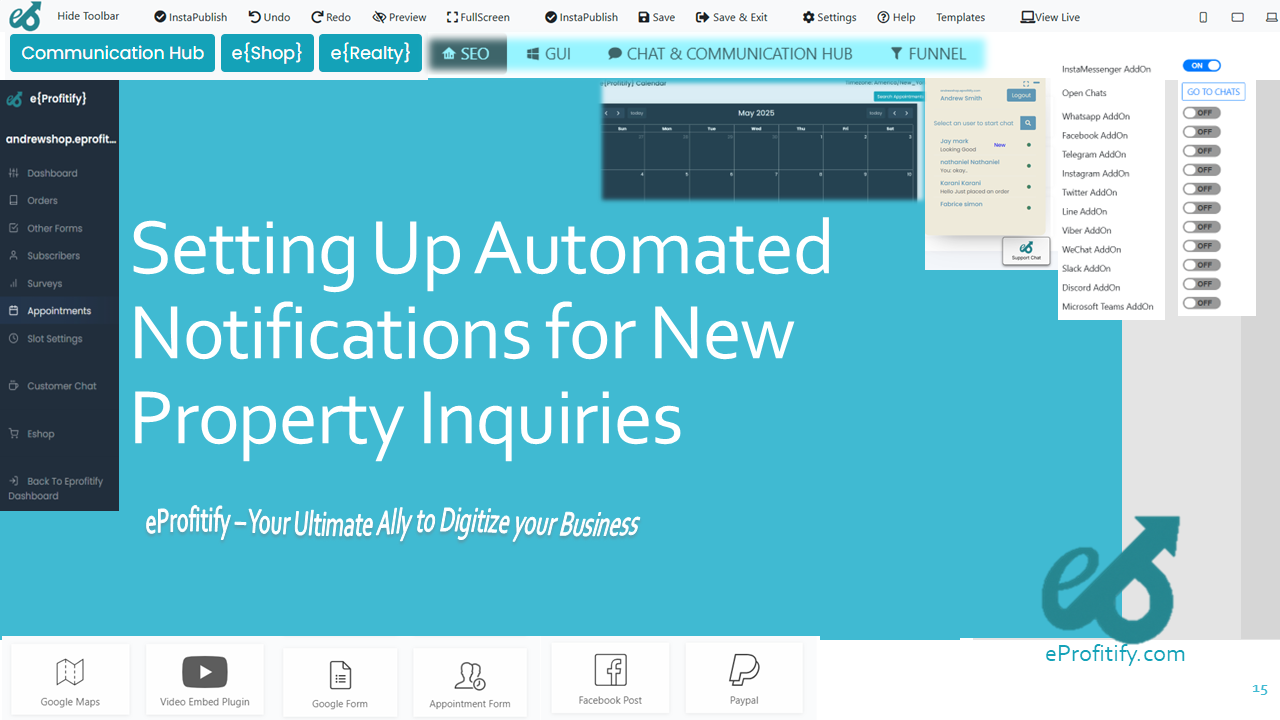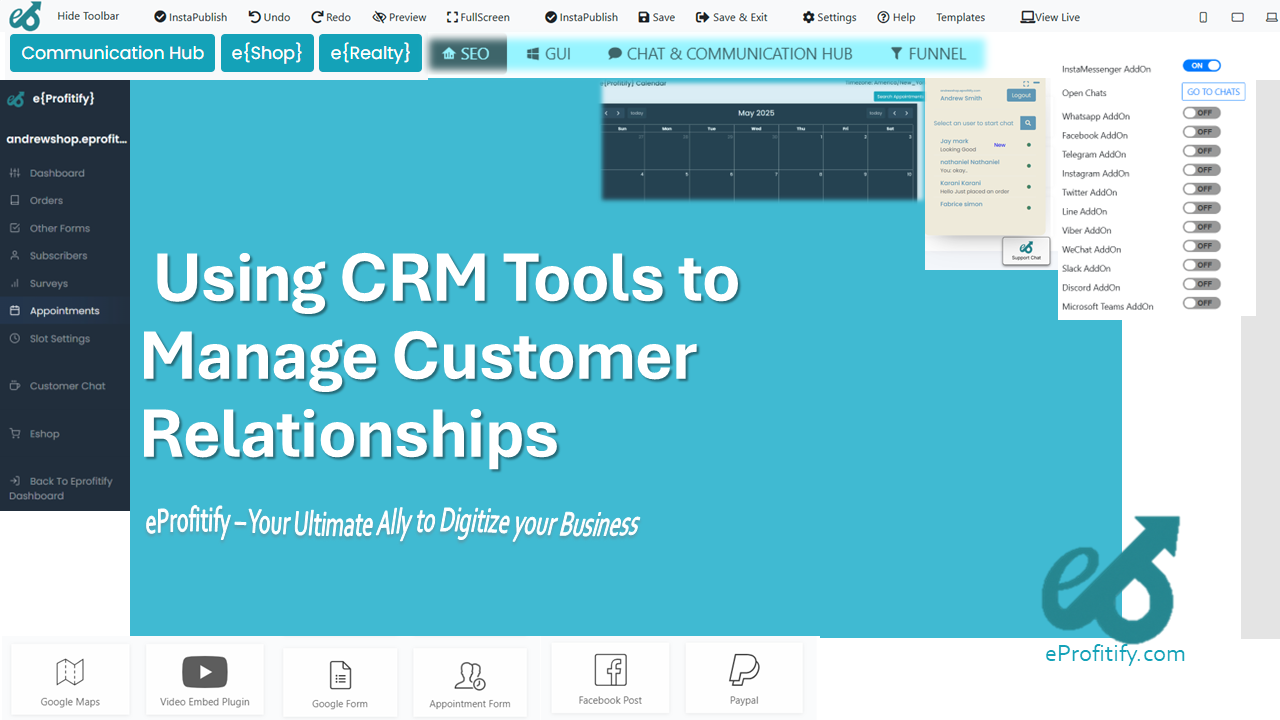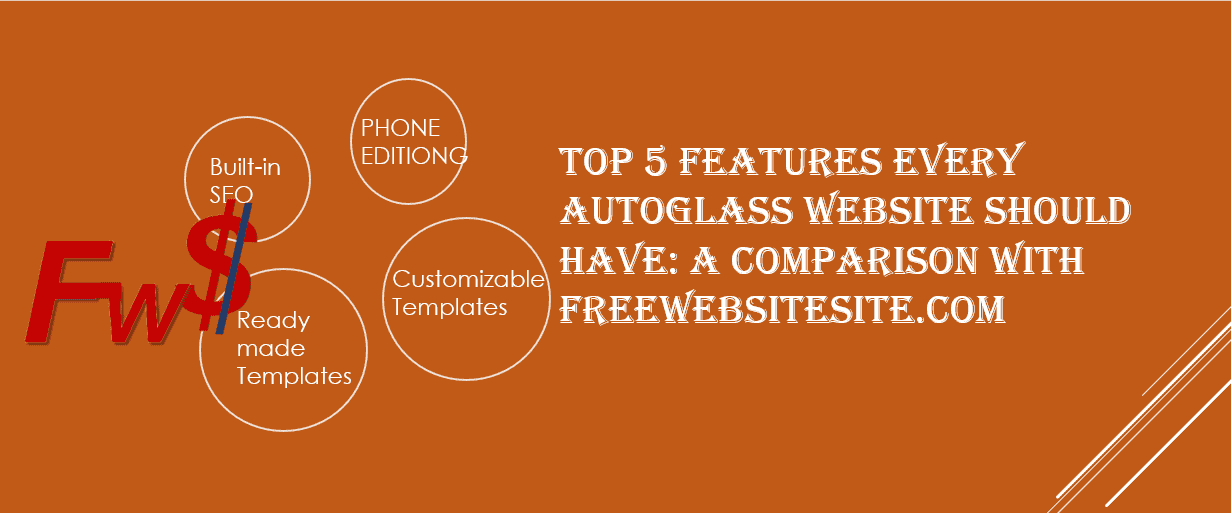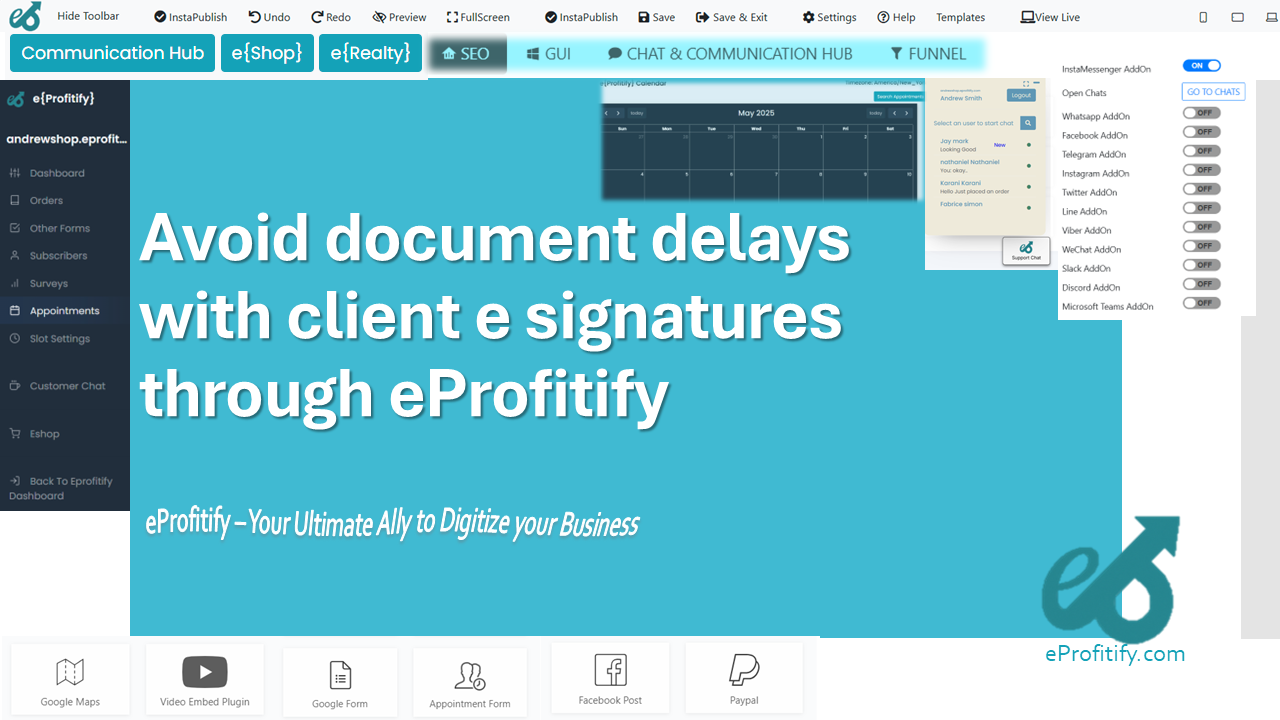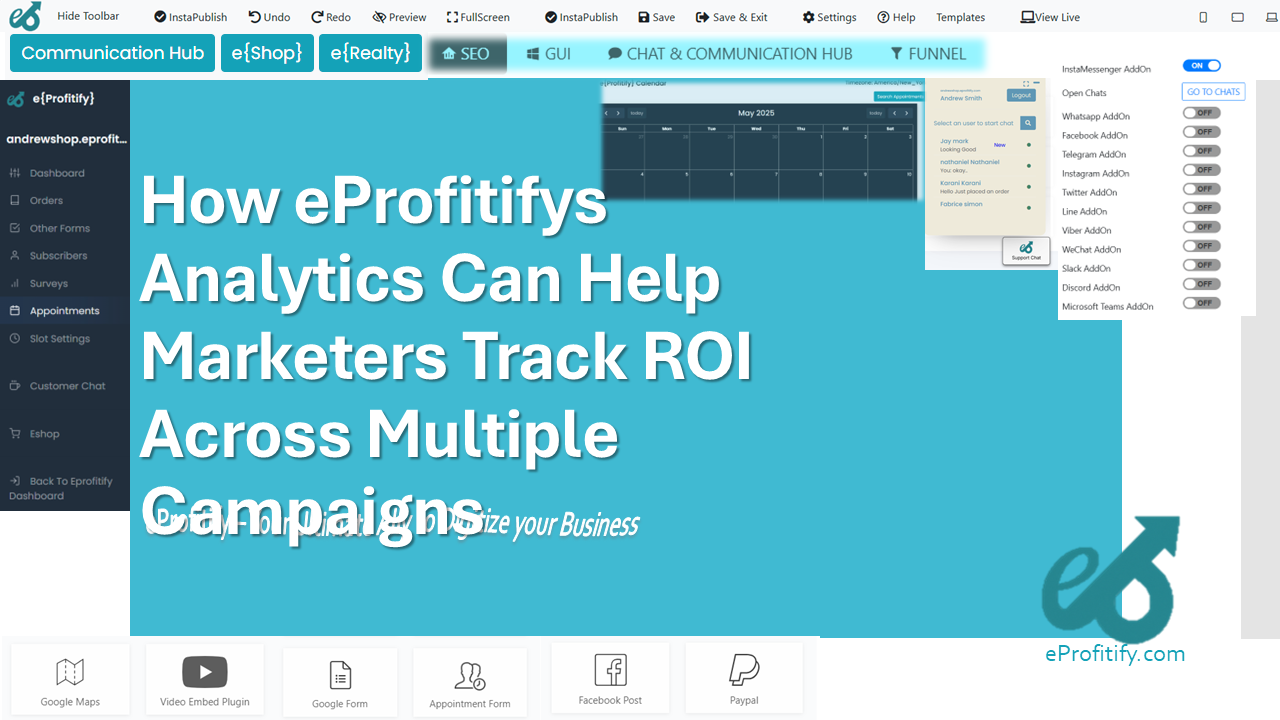Provide secure contract management via eProfitify e signing tools
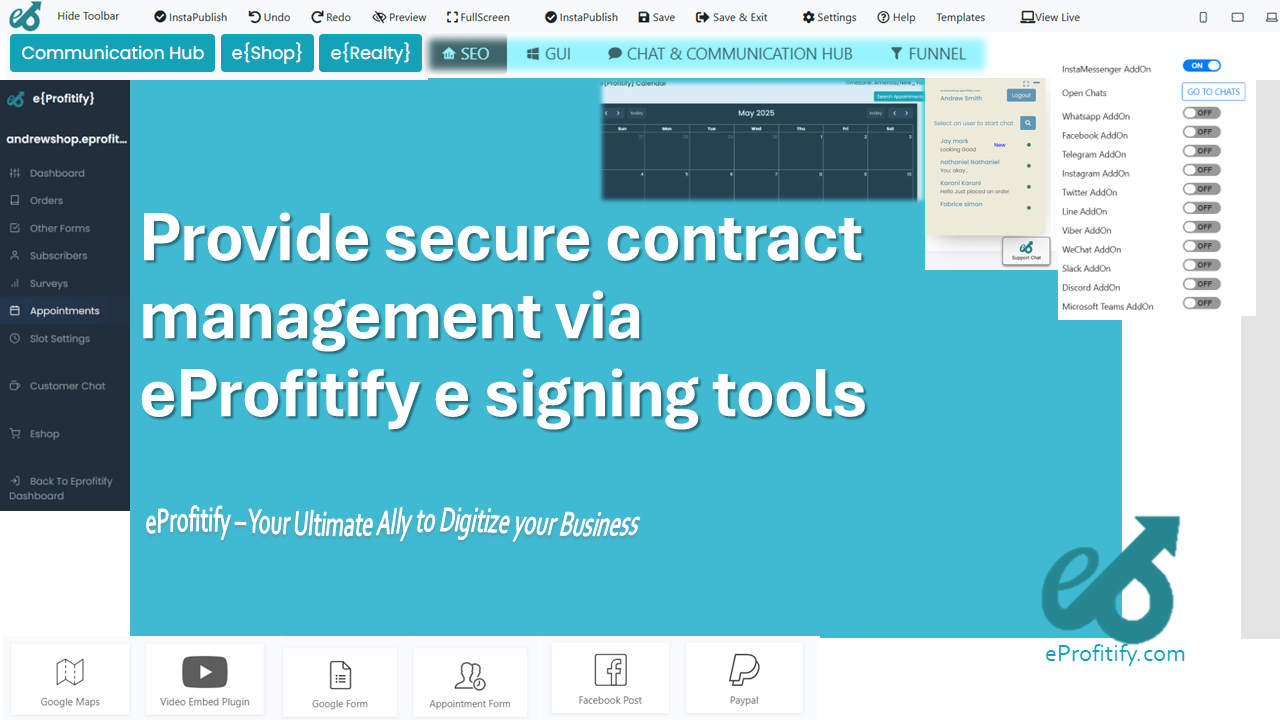
Schedule a LIVE Zoom call with an eProfitify Expert.
Secure Contract Management with eProfitify: Elevating Efficiency and Security in Digital Transactions
In the age of digital transformation, businesses are rapidly adopting tools that streamline workflows, enhance security, and foster collaboration. Among these innovations, electronic signature (e-signature) technology has emerged as a game-changer for contract management, offering speed, compliance, and security. eProfitify, a leading website publishing and management platform, integrates advanced e-signing tools within its suite of features, empowering businesses to manage contracts seamlessly while leveraging additional functionalities like instant messaging, appointment scheduling, e-commerce, and CRM. This article explores how eProfitify revolutionizes secure contract management, backed by industry statistics, and why it stands out as an all-in-one solution for modern enterprises.
The Growing Importance of Secure Contract Management
Contracts are the backbone of business operations, governing partnerships, sales, employment, and compliance. Traditional paper-based processes, however, are plagued by inefficiencies: delays in physical sign-offs, risks of document loss, and vulnerabilities to fraud. According to a Ponemon Institute study, 68% of organizations experienced data breaches due to insecure contract management practices, costing an average of $4.45 million per breach (IBM, 2023).
E-signature solutions address these pain points by digitizing workflows. The global e-signature market, valued at $4.0 billion in 2023, is projected to grow at a 29.87% CAGR, reaching $43.14 billion by 2032 (Grand View Research, 2023). This surge reflects the demand for tools that combine security with agility—a demand eProfitify meets head-on.
eProfitify: A Comprehensive Platform for Modern Businesses
eProfitify is more than just an e-signing tool; it’s a holistic platform that combines website publishing, CRM, e-commerce, appointment management, and instant messaging into a unified ecosystem. This integration eliminates the need for disjointed software, enabling businesses to:
- Centralize operations with a single dashboard.
- Automate workflows to reduce human error.
- Enhance cross-team collaboration via real-time communication.
But its crown jewel is secure contract management, designed to address compliance, accessibility, and scalability challenges.
eProfitify’s E-Signing Tools: Security Meets Simplicity
1. Military-Grade Security Protocols
eProfitify employs AES-256 encryption, the same standard used by financial institutions, to safeguard documents during transmission and storage. Multi-factor authentication (MFA) ensures only authorized users access sensitive contracts. Compliance with regulations like GDPR, HIPAA, and eIDAS further reinforces trust.
2. Streamlined Workflows
The platform reduces contract turnaround time by up to 58% (PwC, 2022). Users can:
- Draft contracts using customizable templates.
- Send documents for e-signature in seconds.
- Track real-time status updates via audit trails.
3. Legally Binding Signatures
eProfitify’s e-signatures comply with the ESIGN Act and UETA, ensuring global enforceability. This eliminates disputes over authenticity—a critical advantage given that 63% of businesses face delays due to manual contract errors (Docusign, 2023).
4. Integration with Complementary Tools
Embed e-signing into broader workflows:
- CRM: Sync signed contracts with client records.
- E-commerce: Automate agreements post-purchase.
- Appointment Management: Schedule follow-ups post-signature.
Statistics Highlighting the Impact of E-Signing
- 80% cost reduction in contract processing (Forrester, 2023).
- 90% of organizations report improved compliance with digital contracts (Gartner, 2023).
- Healthcare sector adoption: 72% of providers use e-signatures for patient consent forms, reducing administrative burdens by 40% (Healthcare IT News, 2023).
Beyond E-Signing: eProfitify’s Suite of Tools
1. Instant Messaging
Facilitate real-time communication between teams and clients, ensuring prompt clarification of contract terms.
2. Appointment Management
Automate reminders for signing deadlines or renewal discussions, synced with Google Calendar and Outlook.
3. E-Commerce Integration
Generate contracts automatically upon purchase (e.g., service agreements), linked to payment gateways like Stripe or PayPal.
4. CRM Capabilities
Track client interactions, store signed documents, and monitor contract milestones—all in one place.
5. Website Publishing
Create professional, mobile-optimized sites to showcase services, with embedded e-signature portals for instant client engagement.
Industry Applications
- Real Estate: Agents e-sign lease agreements and purchase contracts, reducing closing times by 50%.
- Legal Firms: Securely manage client NDAs and litigation documents with role-based access.
- Healthcare: Obtain e-consents from patients while complying with HIPAA.
- Freelancers: Invoice clients and secure project approvals via integrated tools.
Why eProfitify Leads the Market
While competitors like DocuSign or Adobe Sign focus solely on e-signing, eProfitify offers end-to-end business management. Its pricing model—often 50% cheaper than using multiple tools—combined with 24/7 support and AI-driven analytics, positions it as the choice for SMEs and enterprises alike.
Conclusion
In a world prioritizing speed and security, eProfitify’s e-signing tools redefine contract management. Backed by robust security, compliance, and a suite of integrated features—from CRM to e-commerce—it empowers businesses to operate efficiently at scale. As digital transactions dominate, adopting eProfitify isn’t just an upgrade; it’s a strategic imperative.
With 1.5 million users globally and a 98% satisfaction rate, eProfitify proves that the future of business tools lies in unification, innovation, and trust.
Sources: Grand View Research, Ponemon Institute, IBM, PwC, Gartner.


